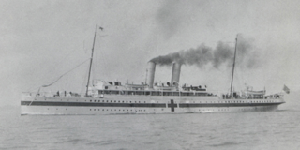
HS Brighton
Samuel Hunter was one of 4 surviving children, (4 deceased 2 of whom gender unknown), the offspring of William Hunter and Elizabeth Brown both of South Shields born 1860-1861, they were married at South Shields, County Durham, in 1882. Their daughter Susannah was born that same year followed by Samuel, March 6th 1884, William 1887, Margaret in 1890 who sadly died within 6 months and Thomas in 1891, whilst they were living in 3 rooms at 180, Palmerston Street. William Snr supported his family employed as a dock labourer. Their youngest daughter Elizabeth born 1893 died aged 1-year in 1894.
The family remained at the same address and William continued his work as a coal trimmer at the docks, by 1901 he had been joined by Samuel (17) and William Jnr (14) as dock labourers. Unfortunately, Elizabeth Hunter nee Brown died during the 4th quarter (Oct/Nov/Dec) 1910 aged 49 years. In 1911 widower William Hunter and his son Thomas (20) were employed by the N. E Railway Company as a prop labourer and a trimmer respectively. Susannah who had married James Stewart in 1901, now widowed with 2 young children, John (5) and Robert (7-months) was living with them as their housekeeper. Samuel was serving his time with the 3rd Durham Light Infantry but was discharged prior to the commencement of WW1, “expiration of service”.
Samuel Hunter was called up September 12th 1914, mobilised that same day, posted again to the 3rd (Special Reserve) Battalion Durham Light Infantry as Private 3/10706 and sent to South Shields and Jarrow as part of the Tyne Defences. Having been posted to the 2nd Battalion D.L.I. of the Regular Army, he joined them at their Depot at Whittington Barracks, Litchfield, and departed with his regiment as part of the British Expeditionary Force to France, December 5th 1914.
The battalion fought on the Aisne, at Armentieres and had moved from France to the Ypres salient in Belgium, where their losses increased at the Battle of Hooge, August 8th-9th 1915. August 9th Private Hunter was wounded by shell fire to the right arm, having been taken back through the lines he was admitted to the 18th Field Ambulance of the 6th Division and from there taken to the hospital and railway head at Etaples. Aboard the Hospital Ship Brighton he was repatriated to England, August 10th.
Whilst on active service (considered such even though he was in England) over the next 6 months he moved between the 2nd and 3rd Battalions D.L.I. at South Shields but also absented himself without leave on 2 occasion for a period of between 8 and 19 days for which he was given 28 days detention. After regaining his liberty, he again absented himself for 174 days from March 10th until August 30th 1916 when he was apprehended and incarcerated for 25 days in the Guard Room at South Shields awaiting trial. He was charged on two counts, 1) Absent without leave, 2) Losing his regimental necessities. Found guilty, September 29th 1916, he was sentenced to 9 months detention.
Private Samuel Hunter’s detention was remitted by 258 days, October 9th 1916, on the understanding he returned to the front with the first available draft. He rejoined the 3rd Battalion Durham Light Infantry for only for 2 days until being posted to the British Expeditionary Force and returning to France, October 11th, joining his regiment in the field, October 27th 1916, before arriving, October 31st at the 35th Infantry Base Depot and posted to the 11th battalion D.L.I. engaging the enemy during the final stages of the Battles of the Somme in France.
The 11th Durham Light Infantry, 60th Brigade, 20th Light Division, were involves in 1917 during the German retreat to the Hindenburg Line. January 8th 1917, Private Hunter was taken to the 34th Casualty Clearing Station suffering from epilepsy and 2 days later was admitted to the 8th General Hospital at Rouen before being shipped back to England, January 14th 1917.
Private 3/10706 Samuel Hunter was posted to the D.L.I. Depot, January 16th 1917 and transferred to Class ‘P’ Reserve, “for men whose services are deemed to be temporarily of more value to the country in civil life rather than the Army, who were not lower than medical grade C and as a result of having served in the Army or T. F. would, if discharged, be eligible for a pension on the grounds of disability or length of service.’
Samuel was officially discharged under King’s Regulations 392(xvi), “no longer physically fit for active service,’ May 9th 1917. King’s certificate 6608. Silver Badge 329067 and awards of the 1914-15 Star, British War Medal and Victory Medal.
Within 6 weeks the family received news of the death of his youngest brother Thomas, serving as Private 22/993 Durham Light Infantry who had died of wounds on the Ypres salient in Belgium, aged 27 years and single.
Samuel Hunter married at South Shields, County Durham, in 1917 to Sabrae Patterson nee McDonald, a local girl, born October 2nd 1891, a war widow with 2 young children, whose husband, Fireman George Patterson aboard H.M.S. Viknor of the Mercantile Marine Reserve, had been lost at sea when the ship disappeared in heavy weather, January 13th 1915, with the loss of all 291 crew. The couple settled at 78, Palmerston Street, South Shields, and had a daughter of their own, Elizabeth born, April 4th 1922.
In 1939 they were living at 14, Bythorn Street, South Shields, Samuel was employed as a labourer and daughter Elizabeth worked at the biscuit factory, Sabrae was a housewife. George Patterson born August 31st 1915 was working as a dock labourer, living with his grandparents Thomas Patterson a retired fitter’s labourer, Isabella Patterson, housewife and his uncle Thomas, also a dock yard labourer, at 164, Palmerston Street.
Sabrae Hunter-Patterson nee McDonald died in 1953, Samuel Hunter in 1964, both deaths registered in the district of South Shields, County Durham.
In God’s safe keeping. Rest In Peace.

